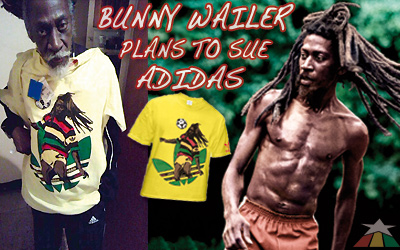Adidas Pays “Tribute To Dancehall” In New Spring Collection With No Dancehall

Eight years after Bunny Wailer and the Rastafari community labeled Adidas the “one stop central of Rastafari Cultural Abuse” and took steps to sue the German sportswear company for using his image and likeness on their shirts without permission, the corporation has released its new spring collection, dubbed “Essence” which it says is “honoring Dancehall”.
However, it might be deja vu for Jamaica, as there are no Dancehall sounds or Dancehall artists on the accompanying advertisement for the gear which runs from US$100 (approx J$13,000) to US$320 (approx J$40,000).
On Friday, Adidas posted a video, which was shot in Jamaica, promoting the Essence line which it captioned: “A tribute to Dancehall and diaspora”.
The clip was directed by Jamaican Jeano Edwards, and styled by British stylist Tom Guinness. Jamaican models Winston Lawrence, Aakesh Henderson, and Tasheika Ogeare also appeared, alongside Jamaican jockeys Babeto Harvey, and Ruja Lahoe.
London composer James William Blades provided the sound, which appears to sample Cornell Campbell’s A Poor Jah Jah Man from his The Gorgon album (1976).
“Adidas Originals and Wales Bonner (designer) return for SS21 with Essence – an exploration of the connection between Britain and the Caribbean. With a focus on tailoring, the capsule sees rich Jamaican references stitched into iconic adidas looks,” the company noted.
In a release, the company added that “Wales Bonner and Adidas Originals have another collaborative collection on the way, which traverses the early 1980s era of Reggae when Dancehall music became a staple in Jamaica”.
“The spring ’21 collection, which is named “Essence,” was first previewed during Men’s Paris Fashion Week in September 2020 and is a follow-up to their “Lovers Rock” fall ’20 lineup. With unique colors, the collab features updated colorways of the Adidas Originals Samba and Nizza Lo silhouettes,” it said, noting that the collection will also offer 1970s era pieces including shorts, T-shirts and tracksuits.
Adidas’ announcement came hours after Jamaican dub poet Mutabaruka, took Clarks Originals, another European company, to task indicating that he did not believe they were being truthful when they said they would not exploit the Jamaican culture for their own gain, via their upcoming Jamaica Pack line of footwear.
Adidas’ announcement of the use of Dancehall, Jamaican films, and other aspects of Jamaican culture to promote commercial products, draws into sharp focus the sentiments raised by Muta about Brand Jamaica being expropriated by foreign companies, without royalties being paid.
Muta had asserted that Clarks, and not Jamaica, would be raking in the profits, and described the British company’s promised ambassadorship deals for Dancehall artists as “a terrible thing” for Jamaica, as “Clarks will continually be sold under the guise of here’s some Jamaican dancehall youth ah wear Clarks booty out here”.
Bunny v. Adidas
In the case of Bunny Wailer, who was an avid footballer in his younger days, the late Reggae icon, in an interview with United Reggae, which was published in December 2014, complained that Adidas had snatched an image of him playing football, from off the internet, and emblazoned it on their line of t-shirts aimed at soccer fans.

After being written to by Wailer, Adidas had offered a settlement of €3,000 which was instantly rubbished by the Reggae legend.
“Yes, I’m a footballer you know. I still play a lot of the football. And now there’s a big issue with Adidas for taking my image off the internet and using it to advertise their produce. Afterwards they offered me meagre compensation for doing that. But that is something that is wrong – it’s not good for the sports or for the entertainment. Those two things go together – sports and entertainment. There’s no respect for I Man from the Adidas Corporation. But I’m still looking forward to see that Adidas come and deal with Bunny Wailer as they should have dealt with Bunny Wailer from that time until now,” Bunny Wailer had said.
It was in March 2013, in a release that was published on Reggaeville, that Bunny had first announced that he and the Rastafari community were in joint legal pursuit of Adidas, and were claiming compensation of $100 million, a far cry from their €3,000 settlement offer.
The release noted that Bunny was first made aware of the misuse of his image by Adidas back in 1995 whilst he was on tour, and again in 2001.
According to the release, “the communication between Bunny Wailer and Adidas began and ended in a disrespectful manner of Adidas acknowledging the existence and use of the illegal image on the shirt, but only offering Bunny Wailer U.S. ($3,000) three thousand dollars for compensation”.
It said Adidas had claimed that its “illegal distribution of Bunny’s image on t-shirts globally only occurred in the summer of 2007 and that they mistakenly used his image as a non-descript and unrecognizable Rastafarian playing football”.
Bunny had vented about Adidas’ “insult” noting that they had sought to treat him less than the recognizable global figure that he was, as a three-time Grammy awardee, recipient of keys to the cities of the U.S.A. and the Order of Jamaica” after “this illegal violation” of his “image and likeness”.
The intellectual property rights of Rastafarians were also highlighted in the release which noted that “the red, gold and green incorporating the IP of the culture and colours of the Ethiopian flag of all Rastafarians globally, including Bunny Wailer, who is a living Elder of the Rastafarian faith” had also been misused by Adidas.
Pointing to what it said was Adidas’ “heights of corporate social irresponsibility” and abuse of the Rastafari Jamaica-based culture and Community”, the Rastafarians had also castigated rapper Snoop Dogg who had renamed himself “Snoop Lion”.
They argued that he too, was an opportunist as he was similarly illegally using and appropriating Rastafari symbols and merchandising, whilst he was working with Adidas on his Reincarnated Project “and coming out with his own Rastafari infused line under Adidas, and commercials, making this company one stop central of Rastafari Cultural Abuse”.
